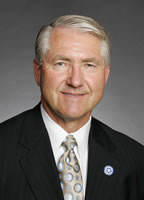In order to provide equal access and equal opportunity to people with diverse abilities, this site has been designed with accessibility in mind. Click here to view
Full Senate Next Stop for Smart on Crime Measure
 Sen. Harry Coates
Sen. Harry Coates
A measure supporters say will reduce recidivism and help more Oklahomans pursue better employment opportunities is awaiting consideration by the full Senate. The legislation, Senate Bill 2070, is authored by Business and Labor Chairman Harry Coates. The Seminole Republican said the bill was suggested by an Oklahoma City-based nonprofit organization, The Education and Employment Ministry (TEEM), which works to help former inmates reenter society. SB 2070 won committee approval on Monday.
“We have dozens of occupations in Oklahoma for which an individual must be licensed by the state, whether they want to be an architect, an occupational therapist or an audiologist. The problem is, a person who has been convicted of a felony is barred from being licensed, no matter what the crime was,” Coates explained. “Senate Bill 2070 would enable an individual to pursue a license as long as the crime they were convicted of is not related to that occupation.”
Tony Zahn is the Executive Director of TEEM. He believes SB 2070 will help guide more people into productive roles in society, and result in fewer former inmates returning to crime and to prison.
“If I can’t get a job for a trade that I am trained for, what are my alternatives? One of the big reasons for recidivism is not having a job that pays a living wage,” Zahn said. “This legislation removes the barrier to successful reentry into society.”
According to data from the Oklahoma State Bureau of Investigation, 8.2 percent of Oklahomans have been convicted of a felony. Coates said the legislation is a common sense approach to dealing with individuals who have already paid their debt to society, and now want to become productive members of their community.
“The saying is true—it isn’t enough to just be tough on crime. We have to be smart on crime, too,” Coates said. “These are individuals who have been held accountable for their actions—we just want to make sure that once they’ve done their time, we’re not putting up road blocks that could force them back down the wrong road.”
 Oklahoma Senate
Oklahoma Senate

